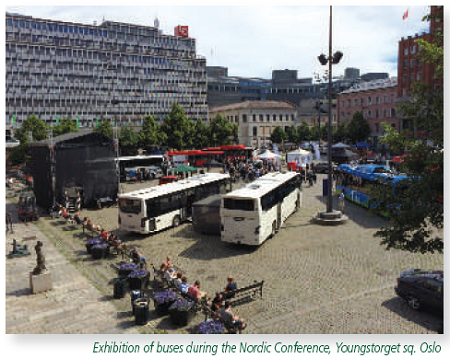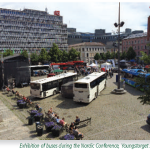From 11-13 of June in Oslo your EMTA secretary witnessed the
biannual conference of the Nordic Public Transport 2014 conference
bringing together over 350 practitioners, traders, exhibitors and
government experts in the Nordic field of transport and traffic.
EMTA colleagues from RUTER in Oslo hosted and presented an
2 day conference programme with a wide array of pitches and
presentations. The aim of the Nordic Conference is to share
innovative solutions, with the purpose to demonstrate good
practices brought by smart instruments to develop sustainable
transport solutions meeting the challenges in Nordic urban
transport and traffic environment.
Lead theme of the conference was New Trends Demanding New
Solutions.
By combining the annual conference of Nordic Public Transport
directors from the Scandinavian urban transport authorities with
the InformNorden congress, bringing together executives IT- and
data collection professionals, the organizers aimed to increase the scope of subjects in lectures, presentations and discussions. The
Nordic Public transport cooperation also addresses the ongoing
academics issues of common interest, often trough ad hoc
working groups. The collaboration was confirmed by a new
agreement in April 2013 between Helsinki Region Traffic (HSL),
Movia, (Denmark), Ruter (Norway) Stockholm County Council,
Transport Administration (Sweden) and Strætó (Iceland).
Amongst others they are also responsible for an annual benchmarking
instrument since 2001, embodied by the BEST-project
(see the next item on this page).
The conference was opened by Bernt Reitan Jenssen, CEO of
RUTER Oslo, who stressed the challenge to cater for an ongoing
rise in demand for urban public transport since 2010 (+40%
in the region, up 30% in the city) and a stabilized level of automobility
inside the Oslo city perimeters, partly due to the effect
of toll levy for car users in the city.

The Chair of the RUTER board mr Bernt Stilluf Karlsen and the
national minister of Transport and Communications, mr Ketil
Solvik-Olson, pointed to the great variety in rapidly changing
needs from the travelling community that government and
authority has to cater. Combined mobility needs of users puts
authorities under a strain to develop into a new role as integrated
mobility facilitator observing interlinked services not just for one
transport mode but to offer wider array of interlinked modes in a
chain of mobility.
Much attention was geared towards the need to expand the level
of quality of service but also to capture information and provide
users with trustworthy quality apps to support their individual
travel needs. The minister mentioned that urban information
demands tend to be properly covered but there is a growing need
to look at improving the access to information on connections
from Oslo to the region and vice versa. The larger cities moreover
are faced with different kind of problems to those of smaller cities
and rural communities. The need to speed up investments on
outside connections for rail to the surrounding Oslo urban area
calls for attention.
The need to emphasize on customer oriented solutions returned
time and again, notably in development of IT-projects and tools.
Listening to the users wishes and needs inadvertently is key to
success for applications on payment or access to suited services.
The aim to offer a new level of flexibility for the traveller and to
improve customer service level stood central as a characteristic for
many presentations.
On the area of ticketless payment an online ticketing Ruter is very
proud to have launched two lauded apps honoured with the
Nordic Marketing Award 2013, one called ‘RUTER Billett’ for quick
purchase of tickets for anyone to download that has a bank
account, so also by tourists and visitors that want to pay as they
go into the city, the other ‘RUTER Reise’ providing real time travel
information on and pre-trip.
Another notion from experiences in the Baltics and in Scandinavian
cities is that free public transport is not making the difference
in shifting from private car to collective means of transport, better
information and quality of service does.
The combined Nordic Transport Conference and InformNorden
demonstrably provided a great wealth of knowledge on current
trends and innovations.
The Nordic Local Transport Marketing Award is partly to honour
the players in the industry who achieve good results and/or dare
to explore new avenues in their meeting with customers and
citizens, on the one hand, to create a recurring ‘happening’, are
executed in connection with the Nordic Local Transport Conference.
HSL from Helsinki won the Nordic Local Transport Marketing
Award 2014 for a marketing campaign HSL carried out in May
2013. The campaign was focused on private car users. A free
personal travel card for 14 days was offered to adults who did not
have a travel card. The cards were ordered over the web. Altogether
28 500 new travel cards were made and sent to the customers.
For more information:
Ruud van der Ploeg or Tore Kass
